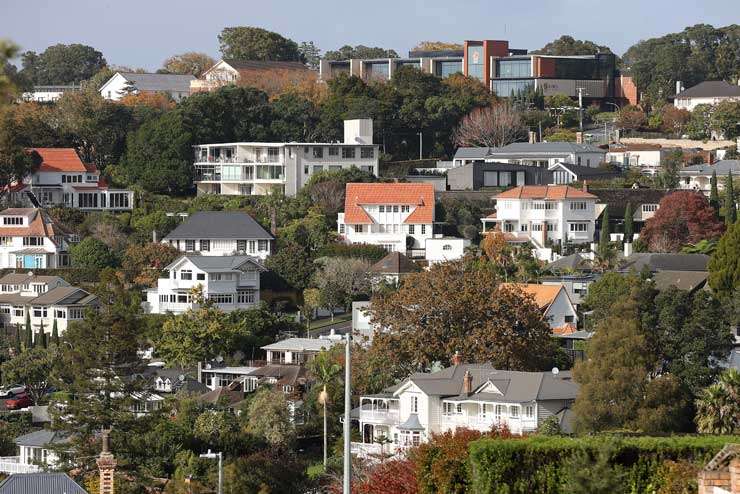Property values have dropped or not grown at all in 105 New Zealand suburbs in the last three months, new research from OneRoof shows.
Auckland has borne the brunt of the sudden change in the housing market, with price drops or zero growth recorded in 59 suburbs – more than a quarter of the city.
The research, which excluded suburbs with less than 20 sales, identified Mount Roskill, in Auckland’s central city, as suffering the steepest drop. Its average property value fell 11.6% – or $166,000 – to $1.28 million, according to the latest figures from the OneRoof-Valocity House Value Index.
Also taking a hit was Torbay, on the northern fringes of Auckland’s North Shore. The waterfront suburb’s average property value fell 6.4% ($97,000) to $1.409m over last three months, while the average property value in neighbouring Browns Bay dropped 2.6% ($38,000) $1.44m.
Start your property search
Other big fallers in the city included Te Atatu Peninsula (-4.8%), Henderson (-4.6%) and Avondale (-4.3%).
The summer cool down in the city’s housing market also affected several higher-profile and higher value suburbs.
Remuera’s average property value dropped $44,000 and Mount Albert’s fell $50,000 while prices in Ponsonby and Grey Lynn were $11,000 and $16,000 lower at the end of March than they were at the end of December 2021.
James Wilson, head of valuation at OneRoof’s data partner, Valocity, said the data showed genuine weaknesses in Auckland’s housing market and future figures would likely show value drops in more suburbs.
He said declines in Mount Roskill and Mount Albert were likely connected to the fall-off in the city’s development market. Both suburbs have a high percentage of properties zoned for intensification and had been popular with developers looking to build townhouses in popular inner-city locations. However, tighter credit conditions, rising costs and lengthy supply chain delays had dampened the demand for properties with development potential and may even push some developers who bought at the height of the market to sell, Wilson said.
“Some developers may sell now before things get worse,” he said, adding that even a handful of “firesales” could have a big impact on overall property values.

Houses in Remuera, where the average property value slipped more than $40,000 over the last three months. Photo / Fiona Goodall
Wilson said that value drops in suburbs such as Henderson and Avondale were likely the result of a sudden drop-off in investor purchases, which had, during much of the market’s hot run, pushed up prices.
“Investors have been a lot more cautious than other buyer groups in these areas. They've basically stopped buying and the suburbs have softened as a result,” he said, adding that some investors may be thinking about selling off some of their stock, or perhaps already were.
Wilson said that the changes affecting Torbay were of a different order. The coastal suburb tends to be more popular with owner-occupiers and families. “Sales volumes are particularly low there with little stock going to market as people opt to sit back and wait to see what happens next,” he said.
Steve Hay, branch manager for Barfoot & Thompson Mt Roskill, told OneRoof there was still plenty of activity in the suburb but price expectations from some vendors were too high for the current market.
The new CVs had not helped with some properties going up 30 or 40%.
“I'm getting offers at $1.05m and [vendors are telling me their] CV has gone up to $1.4m. They assume that’s what their house is worth and it’s ‘um, no’.”
Sales volumes were down because despite bids being made at auctions, vendors were saying no to offers.

Valocity head of valuations James Wilson says there’s weakness in the housing market. Photo / Fiona Goodall
Hay said a lot of properties had been selling in the $1.4m to $1.8m range in 2021 because they had sections that could be developed, but “there’s not a heap of developers falling over themselves to buy the larger sections now”.
Hay said some first-home buyers were holding off making purchase in the belief that house prices would drop 20% or 30%. “But house prices have never ever dropped that far in New Zealand.”
Everyone runs for cover in real estate when there's a blip on the radar, he said, “but then you see the first-home buyers come back six months later and they are paying $50,000 more than they would have paid at the time because prices have just kept going, and they say ‘I wish we hadn't waited’.”
Nick Kochhar, co-owner of Harcourts Mt Roskill, said the suburb’s burgeoning new build market could be having an impact on prices.
Terraced housing usually sells for less than standalone homes and a lot of new ones are coming to fruition, he said.
However, builders are sticking to their prices in the face of rising construction costs in order to maintain their profit. “They want their own price, not what the market is giving. If I’m bringing $1.1m they want $1.2m and they are sitting on that. They’re not saying 'we can still negotiate on this’.”
People would still make money, though, because of the area, he said. “You can’t go wrong because everyone wants to live in central Auckland because of the school zones and the easy access for motorways in shops and everything.“
Across in Torbay, Claire Ellis, branch manager for Harcourts Browns Bay, does not expect any softening to last.
Browns Bay and Torbay attract people looking for more affordable properties than further down the east coast at Takapuna and Milford and first home buyers are emerging again. “You're getting more bang for your buck, so that’s why we do attract more that kind of potential first-home buyer or downsizer, and the banks did affect that."
Omicron had also kept people away from open homes but that picked up last weekend, going from four or five groups through most homes to 16 to 20 groups at some properties, she said.
“Maybe people are just getting over that kind of fear of getting the virus and just going, 'you know what, I’m getting on with my life’.“
Ellis wonders, too, if first-home buyers are out a bit more because of media stories quoting housing experts who say we are going into a buyers’ market which puts a bit of FOMO (Fear of Missing Out) back into buyers.
“ ‘I'm now going to be competing with lots of buyers going forward, I do need to get a wiggle on and buy something’.“
Ellis had also noticed that the new CVs were causing a bit of an issue with vendors. Buyers were not going pay an extra $200,000 because the rates had gone up, she said. “When I was selling I used to say [to vendors], ‘With respect, the council is not buying the house’.“













































































